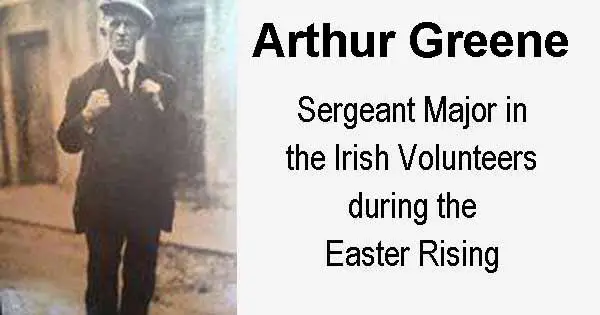Arthur Greene was a Sergeant Major in the Irish Volunteers during the Easter Rising. Here his story is told by his great, great grandnephew, Marcus Howard, using quotes from Arthur’s statements compiled by the Bureau of Military History. See more on Marcus Howard and his videos with descendants of the Easter Rising rebels.

Arthur Greene was a member of the IRB Dundalk 1912-1916 and Sergeant Major of the Irish Volunteers Dundalk. He was born into a Fenian family. Arthur Greene was initiated and sworn into the IRB in 1912. He could see little use in it as they were constantly “hatching” and nothing came of their plans.
He was among the group in Dundalk who started the Irish Volunteers in the Boyle O’Reilly Hall. There were 13 members. Paddy Hughes was the driving force behind the Irish Volunteers in Dundalk.
The quotes in bold are from Arthur’s Witness statement:
“Shortly before Easter Week 1916 a quantity of lead was procured and shotgun cartridges. John Kieran and I spent about 3 weeks working on a mould in the Boyle O’Reilly Hall making slugs for the cartridges; we loaded all the cases with slugs. Material was procured for my mother and she made haversacks. When some of the neighbours asked what she was doing, she told them she was making aprons for her granddaughters in Glasgow.”
(Witness Statement No.238)
On Easter Sunday 1916, 50 of them mobilised in Dundalk at the Boyle O’Reilly Hall led by Donal O’Hannigan.
From Arthur’s Witness statement:
“I was a Sergeant Major at the time. I sent old men and youngsters home whom were unfit for active service.”
Their armament that Easter week was about twenty to twenty five shotguns. Many of the men had revolvers which they had bought themselves. There were no rifles in Dundalk but there were rifles in Ardee. In 1915 in Ardee Eoin MacNeill had a meeting which was the first indication they had that a rising was likely. The Volunteers marched to Ardee after the distribution of their rifles in the direction of Slane. In spite of the countermanding order by Eoin McNeill they continued to Slane.
“I was sent to the Marquis of Cunningham’s gateway with two men to prevent persons going in or out of the gateway.”
(Arthur Greene’s Witness Statement)
They were being followed by R.I.C. men. Approaching Collon they came to a public house.
“I went over to the R.I.C. men and told them that we all required food and refreshments and that I intended to rouse the people in the pub. It was about 6am then.” (Arthur Greene’s Witness Statement)
All the men were put into one room and orders were given that the men drinking would only get one drink each. The R.I.C. took six or seven drinks.
“When I insisted on the order of one drink for each man, Sergeant Wynes told me I was rather strict. We paid the woman for the food and drinks. From the pub we took the direction of Dunleer. It was still raining heavily. We went through Castlebellingham and to the Marsh farm at Lurgangreen.”
( A./ Greene’s Witness Statement)

Next a motor car overtook them and Sean MacEntee shouted out “Dublin is up”. The Volunteers were ordered to deploy on each side of the road and stop all traffic. Two R.I.C. were searched for papers and arms. They held up about thirty motorcars and motorcycles. They made prisoners of two officers and two soldiers and put them in a barn. They dismantled any cars or bicycles they did not require.
Finally Arthur Greene was left on the road with Paddy McHugh and Ned Bailey. The rest had gone to Castlebellingham. A policeman came from Dundalk and they fired a shot at him and he turned back and disappeared. McHugh and Arthur Greene got into a motorcar and took it to Castlebellingham. Two people had been shot by the time they had arrived, Constable McGee and Lieutenant Dunville. They got into the cars and proceeded then in the direction of Dublin. The shootings were an accident because they had been ordered not to shoot any R.I.C. They eventually came to Tyrellstown House and took possession of it.
“We could hear the sounds of rifle fire in Dublin. We remained in Tyrellstown House for eight days under orders to stay there by O’Hannigan.”
(A. Greene’s Witness Statement)
On the 1st of May they were told that the rebels were defeated and that the military knew where they were and that they were to be surrounded that night by soldiers with artillery. At dusk that evening O’Hannigan told them to get up and that everything was over. They evacuated Tyrellstown House.
“O’Hannigan announced he was demobilising us. I felt this breakup with our O/C very much and we all felt disappointed. We travelled mostly by night and slept or rested in barns by day. I went to my home (Dundalk) and was arrested shortly after my arrival by R.I.C. and military. I was roughly handled and they took me to the Courthouse. We were all surrounded by soldiers, handcuffed and marched up to the jail. We were kept there from Wednesday until Saturday.”
(A. Greene’s Witness Statement)
They were then marched to the railway station.
“The officer gave us the order ‘about turn’. I asked ‘What the devil sort of an order was that to handcuffed men?’.”
(A. Greene’s Witness Statement)
They arrived at Amiens Street station (now Connolly Station). They were formed into columns of four and taken under strong military escort to Richmond barracks. 25 of them were put into a big room. They had to lie on the bare floor without bedclothes. They got dog biscuits and black tea the next day.
“We held a mock breech of a promised case against one of our prisoners. I was the judge at this trial.”
(A. Greene’s Witness Statement)
Samples of their writing and fingerprints were taken by a Scotland Yard man. Amongst those Arthur saw in Richmond were Arthur Griffith, Sean McDermott and Darrell Figgis.
“Sean McDermott was executed while we were there. I think he was shot on the 12th of May. I think Lords Decies and Chelmsford sat on the court martial.”
At his trial the following happened: “I was charged last. Sergeant Wymes swore he saw me with a gun and revolver at Lurgangreen, also in a pub in Collon where I was allowing men to get one drink each. He stated I was ‘a severe man’. I told the Sergeant that I didn’t ration him as he got 6 or 7 drinks in the pub. I also told him that at Lurgangreen I told him to go home. I was asked by one of the judges if I was a volunteer. I told him I was in the Volunteers in 1913-14 and later. He said ‘that was Redmond’s time’. He did not give me time to finish what I had intended saying. I shouted up to the Lords that when I sent the police home from Lurgangreen that I knew no more of the doings. I was released with a number of others. I was told I could go home. I was given the price of my journey…
“I got a good reception on my arrival in Dundalk. A lot of friends met me and escorted me home. The 12 or 14 days from I left town on Easter Sunday 1916 until my return home again was one of great physical hardship and mental strain. I will never forget this experience. It took men of great physical endurance to carry on.”
(A. Greene’s Witness statement)
Arthur Greene never married nor had children. He had given up his girlfriend to take care of his deceased sister and husband’s family. This was my great granny’s family.
Did one of your relatives take part in the Easter Rising? If you would like to tell your story in our Easter Rising relatives section we would love to hear from you.
Please fill out the contact form below.
[contact-form-7 id=”36226″ title=”Easter Rising relatives”]
easter-rising-descendents.html
easter-rising.html
The role of Arthur Greene in the Easter Rising
